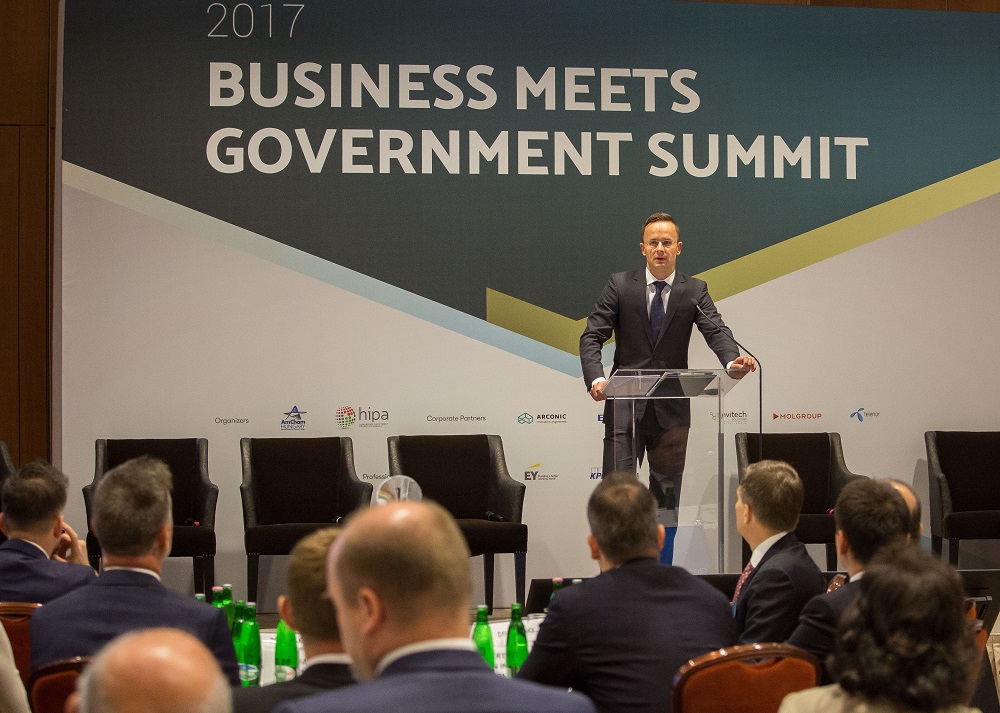
The American Chamber of Commerce in Hungary (AmCham), together with the Hungarian Investment Promotion Agency (HIPA) organized the third Business Meets Government Summit on September 28, with the aim yet again of setting out proposals on how to improve education, taxation, the regulatory environment and innovation.
The primary objective of the conference has, since its inception, been to develop a coherent national strategy to make Hungary a more competitive place to invest in. In order to achieve that, an annual cycle of ongoing consultation takes place where the Business Meets Government Summit is of key importance.
In his opening remarks, HIPA president Róbert Ésik praised the results of previous years as several proposed items have been implemented. Hungary has also moved up the value chain and improved her FDI ranking in comparison to other V4 countries. “We at HIPA will make sure that constructive ideas will continue to get support,” he concluded.
AmCham president Farkas Bársony stressed that, indeed, considerable progress has been made since the regular structured dialogue with the government started; cutting the corporate income tax to 9%, for example, was a game changer. Other achievements include improving dual education, providing R&D incentives and putting an increased focus on language training. Such measures must have contributed to the fact that Hungary has advanced nine places in the World Economic Forum’s latest annual global competitiveness ranking, also released this week.
“There is still a lot to do concerning, among others, education reform, efficiency improvements and the need to have more investments of higher added value,” Bársony said. “We need to carry the momentum and identify the main priorities for the upcoming year.”

On behalf of the government, Péter Szijjártó, Minister of Foreign Affairs and Trade reported on successful talks with U.S. businesses during his latest trip to the United States, where he had met with 31 companies in New York City, many of which shared plans to invest more in Hungary.U.S.-Hungarian economic relations thriving.
More FDI from America should be expected, specifically from Indiana, which is the first individual American state Hungary has ever signed an economic agreement with.“The U.S. is a natural and strategic ally of ours, and the American and the Hungarian government both focus on pragmatism,” he said while reminding that it is the core responsibility of every state to ensure security of people and investments. “And I can assure you that the safety of American investments is fully guaranteed here,” he added.
Bilateral trade cooperation has also been characterized by dynamism and balanced development, with the United States having become the No. 1 export destination of Hungary outside the EU. “Total trade grew to USD 5.5 billion; the number of American companies operating here has surpassed the 1,700 mark, and they now employ more than 100,000,” Szijjártó said.
The new direct flights connecting Budapest to American cities is set to further strengthen relations. Polish airline LOT will launch four flights per week to New York and will fly twice a week to Chicago from May 2018, while American Airlines will start operating flights between Budapest and Philadelphia.
Hungary is still one of the most attractive countries when it comes to investments, the minister highlighted. The lowest corporate income tax rate in Europe, a German type dual-education program, and 3.6% of GDP growth all make the country an ideal destination for FDI. Economic activity is also underlined by record high employment figures and 700,000 newly created jobs since 2010.
More V4 cooperation to come
The Central-European cooperation should be deepened in the future, for which Hungary’s current V4 presidency provides a great opportunity. “We will do our best to keep this unity so that our voice can be heard much more loudly at the EU level,” Szijjártó said, albeit he noted that Franco-German cooperation will determine the development of the Union.
One of the big challenges of today is how manufacturing can be combined with digitalization. Therefore, foreign companies already operating here will no longer need to create new jobs in order to get cash incentives, but it will suffice for them to invest into new technology. Other R&D-related incentives and the further decrease of employer social security contributions are meant to add to economic dynamism, Szijjártó said.
Growth may be hampered by the chronic labor shortage, which should be addressed using various tools. Ukrainian workers are now enjoying an accelerated work permit procedure, unemployed people have access to a growing amount of training, and companies are also financially rewarded for carrying out in-house training.
Even more desirable would be to attract those young skilled Hungarians back that left the country in the recent past. Szijjártó mentioned the example of the establishment of the new BlackRock SSC in Budapest that generated high interest among emigrants. “This could be the best repatriation program, indeed: the more big brands we can convince to set up shop here, the more young Hungarians will return.”
by Levente Herempöli-Tóth, Budapest Business Journal